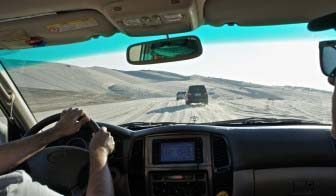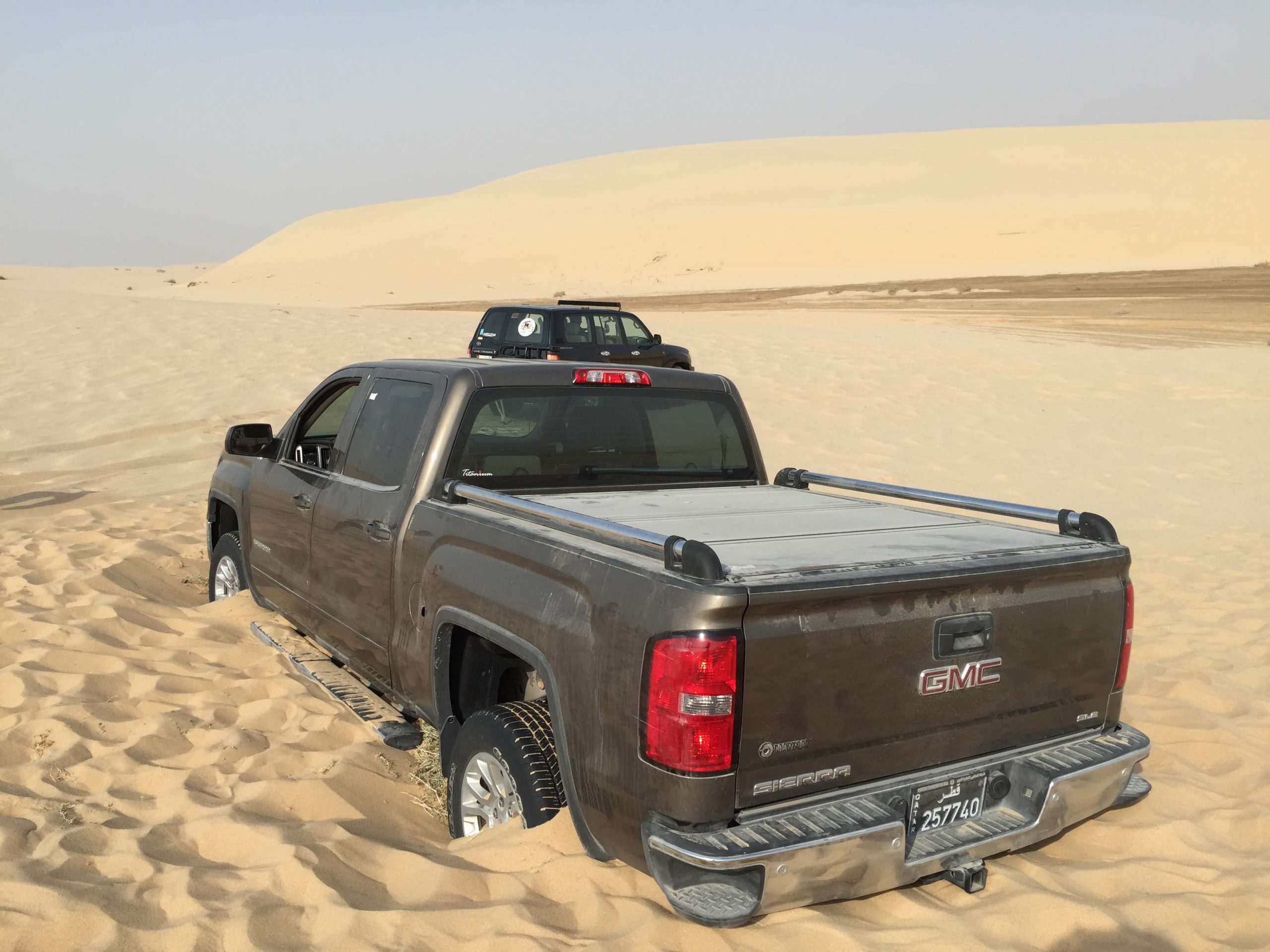
When Irene Sutton, her husband John and five friends decided to go desert camping in the Zekreet area earlier this year, the trip got off on the wrong foot when their vehicle almost immediately got stuck in muddy sand.
Despite the help of other vehicles passing by, Sutton said she could not free her car, even with a tow-rope.

Frantic, she put a call out for help on Facebook, where friends told her about Fazat Mawater (car rescuers), a team of young Qatari and expat men who volunteer to get people out of tricky desert situations.
A group arrived within a few hours and extracted Sutton’s car within minutes, she said.
Speaking to Doha News, Sutton added:
“This is a service that we did not know existed. However, when we needed them, the rescue team member was there to assist with minimum of fuss or drama.
They were hugely efficient, extremely friendly and they gave us the feeling that all was under control and that we should have no worries. This is a testament that there are a lot of very nice, kind, compassionate Qataris out there who are willing to help at a moment’s notice, and all they ask is a ‘Thank you’ or ‘shukran’ for their troubles.”
Formerly known as Fazat Al Dayeen, the group became a part of the Ministry of Youth and Sports last month, after performing more than 600 desert rescues since May.
While many private organizations charge anywhere from QR500 to QR10,000 for desert rescues, Fazat Mawater’s services are free.
The volunteers, however, now receive “rewards” from the ministry and have sponsors such as Hamad Medical Corp., Ooredoo, Woqod and others.
Their main headquarters are in Al Dafna at the Mawater Center.
Safety first
The men who make up the Fazat Mawater team have lived, for the most part, in or near the Qatari desert their whole lives.
Many of them actually resident close to the areas where they are needed the most, including Sealine Beach and Al Udeid desert.

Lots of people flock to these areas between April and October to camp, drive ATVs and go dune bashing.
Speaking to Doha News, team member Mohamed Nimer Kafisheh explained his motivation for helping people stuck in the desert:
“The first rescue I ever did was leading the way for a lost tourist family back to the main road from the sand dunes. I found them in the middle of nowhere and they were headed in the wrong direction.
I am, by nature, an ‘outdoors’ person and I love and appreciate the Qatari desert. This family flagged me down and I told them to follow me. They were back on the right road in no time and I was hooked on helping people in the vast desert of Qatar. From then on, it’s been a huge part of my life.”
Driving in the desert can be hazardous, with numerous accidents reported each year, some of them fatal.
Earlier this year, a Sri Lankan Airlines flight attendant was killed and three of her colleagues injured while on desert safari in Qatar on a weekend evening.

Over the summer alone, a state-run rescue team came to the aid of more than 230 cars and trucks stuck in the sand in popular areas of Qatar’s desert.
According to Kafisheh, most people get stuck in the desert because they do not know to drive in the thick sand and tidal waters.
Sometimes, drivers can be overly confident or not prepared for an emergency situation, which can happen at any time, Kafisheh said, admitting that he himself has been stuck before.
“It was many years ago, and it wasn’t a terribly difficult task for the person who helped me out…
The best way to keep yourself out of trouble is keep track of your speed, the time, your path (to find your way back to the main road) and lastly, stay calm. There’s never any good that comes from panicking.”
Managing a rescue
Kafisheh said he and his team have helped out in many types of desert situations, from simply towing a car out of the sand to scaling a steep sand dune to recover a vehicle on the edge of the precipice whose engine had died.
One of the most harrowing rescues occurred earlier this month in the “white mud pit of Salwa,” which is located about 14km south of the main road headed northwest to Dukhan, running along the western coastline of Qatar.
According to Kafisheh, a vehicle drove into the mud pit unknowingly and its tires sunk quite suddenly.
“The car then sits on its belly helplessly, all in a matter of seconds. The rescue mission required five vehicles and seven guys. It took five long hours, all to rescue one vehicle and its driver.”
When the team gets calls for help, they follow a checklist of very specific questions, first asking: “Is anyone hurt or in danger?”

That question is followed immediately by, “Do you need water?”
Other inquiries include “Can you pinpoint your location?” as well as “Can you send a photo of your car?”
At this point, Kafisheh said “We immediately broadcast the ‘call’ amongst our teams’ members. This way, we can see who’s available, as well as in close proximity, to take on the mission. We’re usually so excited, we end up having to flip coins.”
Trained team
Fazat Mawater leader Saud Al-Mohannadi and Mawater director Salem Saeed Al-Mohannadi said they are careful about whom they choose to be a member of the team, knowing that they are part of an important rescue project and they are representing Qatar.
The rescuers speak English and Arabic, and can also access translators for other foreign languages if need be. In addition, the rescue guys have had training in CPR and first aid, as well as fire and rescue training.

Now that the volunteers have tied up with the ministry, they also have access to highly equipped, all-terrain vehicles and state-of-the-art supplies.
That includes solar-powered car batteries, in case a vehicle is submerged in seawater or cannot be reached by the rescue team in order to receive a jump.
The volunteers also work with police when stranded tourists call 999 and don’t know where they are, which happens quite often.
In these cases, Qatari police rely on satellite equipment that allows them to arrive within 500m of the marooned car.
‘Respect the desert’
In addition to providing 24/7 rescue services, the team at the Mawater Center organizes beach cleanups and family events, urging those they come across to drive responsibly and clean up after themselves.

To access the Mawater Center during desert emergencies, call 7710-9999, 5581-6060, or 33344622.
Alternatively, call 999 and the Qatari police or Coast Guard will link you to a rescue team depending on where you are in Qatar.
To avoid needing their services in the first place, Fazat Mawater rescue team offers these tips:
- Inform friends or family before taking a day or overnight desert trip. This way, if you run into any issues, people will know that you are “out there”.
- Make sure your car is desert-ready. Fill up the gas tank, check fluids and water level, verify your car tire treads are in tip-top shape and do not forget to deflate the air in all of your tires once you get near the dunes to accommodate the sandy terrain. According to the rescue team, you can buy a good quality mobile air pump for between QR250-400. This apparatus works on your vehicle’s battery supply and is no bigger than a couple boxes of tissues. There are also tire air pump stations around the desert if you need help.
- Carry recovery gear in your vehicle. Have a good-quality “snatch rope” in your car (at least 6m/20 feet) in case another car needs to pull your car out of the sand.
- Stay hydrated. Bring enough water for your group and then double it, just in case! Also pack non-perishable snacks, a flashlight and a couple blankets in case of emergency.
- Ensure your phone/phones are fully charged before you leave and bring a phone charger that easily plugs into your vehicle lighter. Carry a fully-charged back-up phone for urgencies.
In short, Kafisheh said:
“Always be careful and cautious when driving in the desert. Take the long way around if it’s the safer way. Spend an extra few minutes learning about driving over dunes as well as how to prepare yourself and your vehicle. Don’t attempt something if you are not comfortable. Respect the desert.”
What tips would you add? Thoughts?







